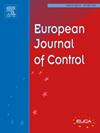利用双输入输出参数化对稳定模型进行闭环识别
IF 2.5
3区 计算机科学
Q2 AUTOMATION & CONTROL SYSTEMS
引用次数: 0
摘要
本文介绍了从闭环数据识别线性时变系统的双输入输出参数化(dual IOP)。它借鉴了最近为合成稳定控制器而开发的输入输出参数化方法。控制器是以闭环传递函数为参数的,从外部干扰到系统的输入和输出,都受限于一个给定的子空间。与此类似,对偶 IOP 方法也是通过类似的闭环传递函数(也称为对偶参数)对未知工厂进行参数化。在这种情况下,这些闭环传递函数受限于一个仿射子空间,从而保证识别出的工厂由已知控制器控制。与现有的保证闭环稳定性的闭环识别技术(如双 Youla 参数化)相比,双 IOP 既不需要控制器的双同调因子化,也不需要控制器稳定的标称工厂。双 IOP 也不像双系统级参数化那样取决于控制器的阶数和状态空间实现。仿真表明,双 IOP 优于现有的基准方法。本文章由计算机程序翻译,如有差异,请以英文原文为准。
Closed-loop identification of stabilized models using dual input–output parameterization
This paper introduces a dual input–output parameterization (dual IOP) for the identification of linear time-invariant systems from closed-loop data. It draws inspiration from the recent input–output parameterization developed to synthesize a stabilizing controller. The controller is parameterized in terms of closed-loop transfer functions, from the external disturbances to the input and output of the system, constrained to lie in a given subspace. Analogously, the dual IOP method parameterizes the unknown plant with analogous closed-loop transfer functions, also referred to as dual parameters. In this case, these closed-loop transfer functions are constrained to lie in an affine subspace guaranteeing that the identified plant is stabilized by the known controller. Compared with existing closed-loop identification techniques guaranteeing closed-loop stability, such as the dual Youla parameterization, the dual IOP requires neither a doubly-coprime factorization of the controller nor a nominal plant that is stabilized by the controller. The dual IOP does not depend on the order and the state-space realization of the controller either, as in the dual system-level parameterization. Simulation shows that the dual IOP outperforms the existing benchmark methods.
求助全文
通过发布文献求助,成功后即可免费获取论文全文。
去求助
来源期刊

European Journal of Control
工程技术-自动化与控制系统
CiteScore
5.80
自引率
5.90%
发文量
131
审稿时长
1 months
期刊介绍:
The European Control Association (EUCA) has among its objectives to promote the development of the discipline. Apart from the European Control Conferences, the European Journal of Control is the Association''s main channel for the dissemination of important contributions in the field.
The aim of the Journal is to publish high quality papers on the theory and practice of control and systems engineering.
The scope of the Journal will be wide and cover all aspects of the discipline including methodologies, techniques and applications.
Research in control and systems engineering is necessary to develop new concepts and tools which enhance our understanding and improve our ability to design and implement high performance control systems. Submitted papers should stress the practical motivations and relevance of their results.
The design and implementation of a successful control system requires the use of a range of techniques:
Modelling
Robustness Analysis
Identification
Optimization
Control Law Design
Numerical analysis
Fault Detection, and so on.
 求助内容:
求助内容: 应助结果提醒方式:
应助结果提醒方式:


